Is it your goal to die “young” at a very old age? Two critical factors in slowing aging and staying healthy are oxidative stress and inflammation. Oxidative stress is associated with a cascade of harmful changes at a cellular level, which also leads to chronic inflammation and even greater oxidative damage. While lifestyle and diet are key factors to consider, two botanicals—aronia berry and grape seed—can defend you against virtually any health concern you might face.
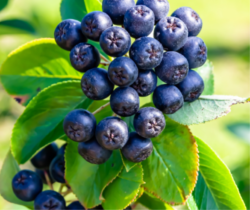
Powerful Aronia Berries Fight Free Radicals
There are hundreds—maybe even thousands—of substances that can act as antioxidants. However, antioxidants are not all the same. While all antioxidants neutralize free radicals, some are more effective than others. One of the best ways to protect yourself from free radical damage and inflammation is through some of the most powerful, natural antioxidants, anthocyanins, which belong to a family of beneficial plant compounds called polyphenols.
You’ve probably encountered anthocyanins more often than you realize: any time you see rich purple, blue, black, or deep red fruits, you’re seeing anthocyanins. These compounds provide color and protect the plants from oxidative stress. These same compounds protect you from oxidative damage as well, and aronia fruits are an excellent source.
In fact, the ORAC value—a measure of their ability to absorb free radicals that damage cells and accelerate aging—is an astounding 16,000 per 100 grams in aronia berries. That rating far exceeds even blueberries, which are incredibly wellknown free radical fighters. Blueberries come in at just 6,552 per 100 grams.
Unlike blueberries, aronia berries (also known as chokeberries) are tart, similar to drinking a dry wine. However, in the case of aronia berries, that tartness also indicates a high level of antioxidants, making them one of the world’s most valuable, natural medicines.
Overall, aronia berries have the powerful ability to stop the progression of free radical damage and begin the healing process in the body. This makes the berries incredibly effective for treating so many conditions, including heart disease, high blood pressure, metabolic syndrome, type 2 diabetes, and even cancer.
Grape Seed Compounds Stop Oxidative Stress
Scientists, medical researchers, and ordinary people alike have long known that grapes provide a wide range of protective benefits. The wine-friendly French diet is a case in point, with its intake of anthocyanin compounds from the skins of and fruits of grapes used in a variety of vintages. But the truth is, incredible nutrient riches are found in the seeds of grapes, too.
Why Grape Seed?
The study of grape seed oligomeric proanthocyanidins (OPCs) developed in a roundabout way. A French professor, Jacques Masquellier, was fascinated by the history of explorer Jacques Cartier’s crew making a tea of pine bark that saved them from a nutritional disease called scurvy. And pine bark and grape seeds have one thing in common: both contain OPCs. So, using a locally available source while working in the wine-rich region of Bordeaux, Masquellier pioneered extracting OPCs from grape seeds. And grape seed OPCs have proven to be incredibly valuable for strengthening your health in many ways. These antioxidant compounds have been shown to be better free radical scavengers and inhibitors of oxidative tissue damage than vitamin C, vitamin E, or beta carotene.
However, finding a grape seed extract that is effective can be a challenge. That is because not all grape seed OPCs are actually absorbable.
Being tannin-free is a critical factor for grape seed extracts to be effective—it’s one of the reasons that the researchers studying effects on cancer chose the same French grape seed extract I prefer for their work. While tannins are technically OPCs, they are not readily absorbed by the body, so their potential is severely limited. Tannin-free sources of OPCs, on the other hand, have a low-molecular weight and are easily absorbed.
Grape seed is well-known for preventing heart disease: it protects blood vessel walls from free radical damage, prevents the dangerous oxidation of LDL cholesterol, and lowers blood pressure. But grape seed can also play a role in strengthening the structure of joints and bones, preventing damage to brain and nerve cells leading to Alzheimer’s disease and dementia, and preserving delicate blood vessels in the eyes to prevent vision problems.
In fact, OPCs from a tannin-free French grape seed extract have been found to utterly shrink tumor cells into oblivion and prevent tumor recurrence, because the OPCs kill cancer stem cells—the “seeds” of tumors that conventional chemotherapy drugs can’t reach.
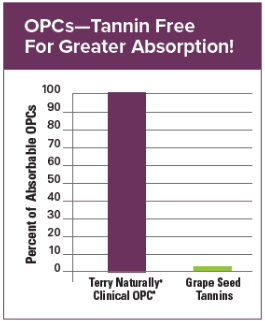
Two Key Botanicals for Healthy Aging and a Long Life
Aronia and grape seed extract are the ideal botanical duo for a long life. Included in a daily regimen, these two nutrients can deliver incredible results and can help you overcome some of the biggest challenges in aging well and living with vibrant good health for the long haul.
What Can You Do to Stop Oxidative Damage? Quite a Bit!
While some oxidation is inevitable during the body’s daily functions, reducing excessive levels of oxidative stress is key to good health, and is a goal within your grasp.
Start with your diet. Get proteins every day and at every meal. Proteins are our original energy and power foods, and they are necessary to maintain health at a cellular level. Remember that animal protein is rich in readily absorbable amino acids, which are the building blocks of a healthy mind and body.
For fats, consider healthy fats like cream and butter, coconut oil, and especially olive oil. Many Americans probably consume around 60 to 70 percent of their meals as refined and processed carbohydrates, and 20 to 30 percent unhealthy fats (omega- 6 from vegetable oils, shortening and margarine), which is certain to create intensive levels of oxidative stress and take a toll on overall health.
And of course, enrich your diet with colorful fruits and vegetables that have a high antioxidant value. As I’ve mentioned previously, aronia berries have the highest antioxidant ORAC value of all berries. They are rich sources of anthocyanins that protect you from free radicals and oxidative damage.
Additional sensible lifestyle choices keep your natural antioxidant defenses strong as well: don’t smoke or vape, and if you do—stop. Maintain a healthy weight with appropriate exercise and minimize your exposure to toxins, pesticides, drugs, chemicals, and pollutants. And one other critical step—add the powerful herbal antioxidant combination of aronia berry and grape seed extract to your daily regimen for concentrated and consistent antioxidant effects.
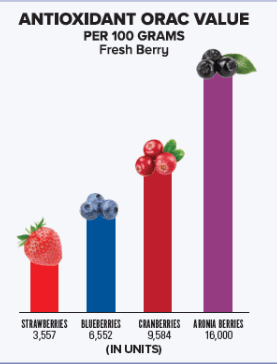
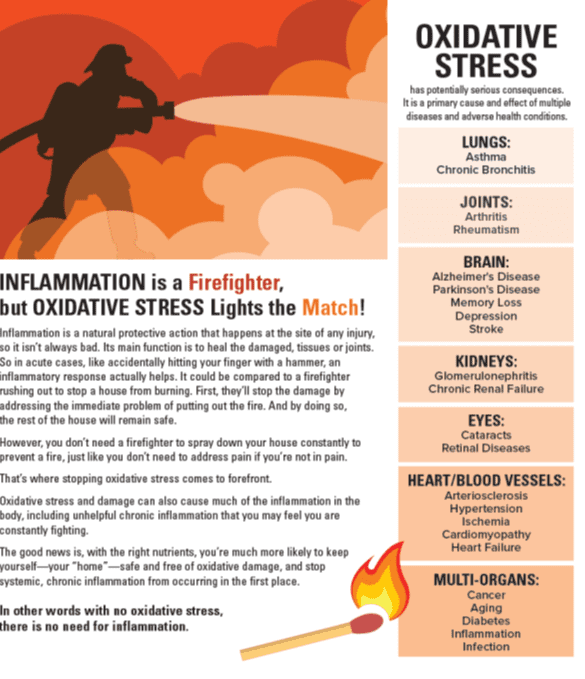
ARONIA BERRY AND GRAPE SEED EXTRACT: Antioxidant Protection from Head to Toe
Head to toe, from preventing dementia to reducing risk of nerve damage in hands and feet, the antioxidant power of aronia and grape seed can keep your body healthy and strong. While there are numerous benefits associated with aronia and grape seed OPCs, here is a summary of what the scientific research has to say about some of the principal effects of these two incredibly important antioxidants.
 HEART – Heart disease remains a leading cause of death in America, and one that may often be preventable. The ability to keep arteries flexible and strong, and protect them from oxidative stress, are critical ways aronia and grape seed can lower blood pressure, prevent abnormal blood clotting, and reduce risk of heart attack and stroke.
HEART – Heart disease remains a leading cause of death in America, and one that may often be preventable. The ability to keep arteries flexible and strong, and protect them from oxidative stress, are critical ways aronia and grape seed can lower blood pressure, prevent abnormal blood clotting, and reduce risk of heart attack and stroke. BRAIN – Brain cells are highly sensitive to oxidative stress, which is why intake of antioxidants is so important for healthy brain aging and preventing mental decline. In an experimental model of Alzheimer’s disease, treatment with aronia berry reversed memory problems and returned memory and behavior to normal, while grape seed extract has been shown to protect the brain against the damaging changes associated with Alzheimer’s disease.
BRAIN – Brain cells are highly sensitive to oxidative stress, which is why intake of antioxidants is so important for healthy brain aging and preventing mental decline. In an experimental model of Alzheimer’s disease, treatment with aronia berry reversed memory problems and returned memory and behavior to normal, while grape seed extract has been shown to protect the brain against the damaging changes associated with Alzheimer’s disease. BLOOD SUGAR – While nothing can replace making significant lifestyle changes, aronia berry and grape seed extract can play an important role in helping to improve insulin sensitivity and decrease blood sugar and HbA1c levels. In adults with type 2 diabetes, aronia (administered as a juice) reduced HbA1c levels by 20 percent and fasting blood sugar levels by over 30 percent.
BLOOD SUGAR – While nothing can replace making significant lifestyle changes, aronia berry and grape seed extract can play an important role in helping to improve insulin sensitivity and decrease blood sugar and HbA1c levels. In adults with type 2 diabetes, aronia (administered as a juice) reduced HbA1c levels by 20 percent and fasting blood sugar levels by over 30 percent. CANCER PREVENTION – Tumor growth is set in motion, in part, due to oxidative stress creating uncontrolled systemic inflammation and starting “misfires” in the way cells replicate. But fortunately, aronia and grape seed can potentially reverse this course. Due to the actions of aronia’s anthocyanin compounds, scientific research has found that it inhibits the growth of leukemia, and breast, colon, and cervical cancer cells. The tannin-free French grape seed extract I prefer has multiple studies showing that it not only shrinks tumor cells into oblivion, but also prevents tumor recurrence, because the OPCs kill cancer stem cells – the “seeds” of tumors that conventional chemotherapy drugs can’t reach. Additionally, leading-edge scientific research has shown that this grape seed extract can make chemotherapy drugs more effective. There is also research on the horizon that pairs aronia with this grape seed to show their combined effect on slowing the rate of tumor growth, and it will, no doubt, prove the combination will be incredibly effective.
CANCER PREVENTION – Tumor growth is set in motion, in part, due to oxidative stress creating uncontrolled systemic inflammation and starting “misfires” in the way cells replicate. But fortunately, aronia and grape seed can potentially reverse this course. Due to the actions of aronia’s anthocyanin compounds, scientific research has found that it inhibits the growth of leukemia, and breast, colon, and cervical cancer cells. The tannin-free French grape seed extract I prefer has multiple studies showing that it not only shrinks tumor cells into oblivion, but also prevents tumor recurrence, because the OPCs kill cancer stem cells – the “seeds” of tumors that conventional chemotherapy drugs can’t reach. Additionally, leading-edge scientific research has shown that this grape seed extract can make chemotherapy drugs more effective. There is also research on the horizon that pairs aronia with this grape seed to show their combined effect on slowing the rate of tumor growth, and it will, no doubt, prove the combination will be incredibly effective. EYES/VISION – The eyes are incredibly delicate structures and are subject to significant strain and oxidative stress due to blue light from excessive screen time, dust and particulates, blood sugar levels, and exposure to sunlight. Fortunately, both aronia and grape seed extract can protect the precious gift of sight. Laboratory research with aronia has found that it may protect against age-related macular degeneration by strengthening the outer layer of the retina by 44 percent and decreasing levels of damaging oxidative compounds. Grape seed, too, has excellent vision-protecting ability, and may help prevent cataracts, which affect over 24 million Americans over the age of 40. Laboratory study found that grape seed extract activates natural antioxidant proteins that swoop in to stop oxidative damage to the cells of the lens. In a one-year, multi-center, double-blind clinical trial, grape seed extract outperformed calcium dobesilate, a drug often used for retinopathy, in reducing hard exudates, waxy deposits in the retina created from lipid material leaking from blood vessels in the eyes. Additionally, grape seed OPCs also inhibit processes in the body that would lead to lens damage, making these compounds especially critical for anyone with concerns about their vision.
EYES/VISION – The eyes are incredibly delicate structures and are subject to significant strain and oxidative stress due to blue light from excessive screen time, dust and particulates, blood sugar levels, and exposure to sunlight. Fortunately, both aronia and grape seed extract can protect the precious gift of sight. Laboratory research with aronia has found that it may protect against age-related macular degeneration by strengthening the outer layer of the retina by 44 percent and decreasing levels of damaging oxidative compounds. Grape seed, too, has excellent vision-protecting ability, and may help prevent cataracts, which affect over 24 million Americans over the age of 40. Laboratory study found that grape seed extract activates natural antioxidant proteins that swoop in to stop oxidative damage to the cells of the lens. In a one-year, multi-center, double-blind clinical trial, grape seed extract outperformed calcium dobesilate, a drug often used for retinopathy, in reducing hard exudates, waxy deposits in the retina created from lipid material leaking from blood vessels in the eyes. Additionally, grape seed OPCs also inhibit processes in the body that would lead to lens damage, making these compounds especially critical for anyone with concerns about their vision.When in doubt, always consult your physician or healthcare practitioner. This article is intended to provide you with information to maintain your health.
Give Yourself the Protection You Need
Is it your goal to die “young” at a very old age? Two critical factors in slowing aging and staying healthy are oxidative stress and inflammation. Oxidative stress is associated with a cascade of harmful changes at a cellular level, which also leads to chronic inflammation and even greater oxidative damage. While lifestyle and diet are key factors to consider, two botanicals—aronia berry and grape seed—can defend you against virtually any health concern you might face.
Powerful Aronia Berries Fight Free Radicals
There are hundreds—maybe even thousands—of substances that can act as antioxidants. However, antioxidants are not all the same. While all antioxidants neutralize free radicals, some are more effective than others. One of the best ways to protect yourself from free radical damage and inflammation is through some of the most powerful natural antioxidants, anthocyanins, which belong to a family of beneficial plant compounds called polyphenols.
You’ve probably encountered anthocyanins more often than you realize: any time you see rich purple, blue, black, or deep red fruits, you’re seeing anthocyanins. These compounds provide color and protect the plants from oxidative stress. These same compounds protect you from oxidative damage as well, and aronia fruits are an excellent source.
In fact, the oxygen radical absorbance capacity (ORAC) value of aronia berries is an astounding 16,000 per 100 grams. That ability to absorb free radicals exceeds even blueberries, at 6,552 per 100 grams by comparison.
Overall, this makes aronia berries extremely effective for treating so many conditions, including heart disease, high blood pressure, metabolic syndrome,
type 2 diabetes, and even cancer.
In fact, aronia berries work along multiple pathways to stop cancer development and spread. They can also make chemotherapy drugs more effective. Leading-edge research shows that aronia berry extract paired with gemcitabine, a commonly-used chemotherapy drug for pancreatic cancer, reduced drug-resistant cancer cells by 75 percent, showing that it can make conventional medicines much more effective.
Other research shows that aronia berry extract provides 6 times the stopping power when pitted against colon cancer cells compared to untreated cells. Another scientific study reported that aronia berry extract and French grape seed extract reduced cancer-promoting gene activity by 75 percent!!
Grape Seed Compounds Stop Oxidative Stress
Scientists, medical researchers, and ordinary people alike have long known that grapes provide a wide range of protective benefits. The wine-friendly French diet is a case in point, with its intake of anthocyanin compounds from the skins and fruits of grapes used in a variety of vintages. But the truth is, incredible nutrient riches are found in the seeds of grapes, too.
Why Grape Seed?
The study of grape seed oligomeric proanthocyanidins (OPCs) developed in a roundabout way. A French professor, Jacques Masquellier, was fascinated by the history of explorer Jacques Cartier’s crew making a tea of pine bark that saved them from a nutritional disease called scurvy. And pine bark and grape seeds have one thing in common: both contain OPCs. So, using a locally available source while working in the wine-rich region of Bordeaux, Masquellier pioneered extracting OPCs from grape seeds.
And grape seed OPCs have proven to be incredibly valuable for strengthening your health in many ways. These antioxidant compounds have been shown to be better free radical scavengers and inhibitors of oxidative tissue damage than vitamin C, vitamin E, or beta carotene.
However, finding a grape seed extract that is effective can be a challenge. That is because not all grape seed OPCs are actually absorbable.
Low molecular weight is a critical factor for grape seed extracts to be effective—it’s one of the reasons that the researchers studying effects on cancer chose the same French grape seed extract I recommend for their work. Other grape seed extracts contain high molecular weight OPCs that are not absorbed by the body, so their potential is severely limited. Low molecular weight OPCs, on the other hand, are easily absorbed by the body and provide substantial health benefits.
Grape seed is well-known for preventing heart disease: it protects blood vessel walls from free radical damage, prevents the dangerous oxidation of LDL cholesterol, and lowers blood pressure. But grape seed can also play a role in strengthening the structure of joints and bones, preventing damage to brain and nerve cells leading to Alzheimer’s disease and dementia, and preserving delicate blood vessels in the eyes to prevent vision problems.
In fact, OPCs from French grape seed extract have been found to utterly shrink tumor cells into oblivion and prevent tumor recurrence, because the OPCs kill cancer stem cells—the “seeds” of tumors that conventional chemotherapy drugs can’t reach.
Two Key Botanicals for Healthy Aging and a Long Life
Aronia and grape seed extracts are the ideal botanical duo for a long life. Included in a daily regimen, these two nutrients can deliver incredible results and can help you overcome some of the
biggest challenges in aging well and living with vibrant good health for the long haul.
What Can You Do to Stop Oxidative Damage? Quite a Bit!
While some oxidation is inevitable during the body’s daily functions, reducing excessive levels of oxidative stress is key to good health, and is a goal within your grasp.
Start with your diet. Get proteins every day and at every meal. Proteins are our original energy and power foods, and they are necessary to maintain health at a cellular level. Sources of readily absorbable amino acids are critical because they are the building blocks of a healthy mind and body.
For fats, consider healthy fats like cream and butter, coconut oil, and especially olive oil. Many Americans consume around 60 to 70 percent of their meals as refined and processed carbohydrates, and 20 to 30 percent unhealthy fats (omega-6 from vegetable oils, shortening and margarine), which is certain to create intensive levels of oxidative stress and take a toll on overall health.
And of course, enrich your diet with colorful fruits and vegetables that have a high antioxidant value. As I’ve mentioned previously, aronia berries have the highest antioxidant ORAC value of all berries. They are rich sources of anthocyanins that protect you from free radicals and oxidative damage.
Additional sensible lifestyle choices keep your natural antioxidant defenses strong as well: don’t smoke or vape, and if you do—stop. Maintain a healthy weight with appropriate exercise and minimize your exposure to toxins, pesticides, drugs, chemicals, and pollutants. And one other critical step—add the powerful herbal antioxidant combination of aronia berry and grape seed extract to your daily regimen for concentrated and consistent antioxidant effects.
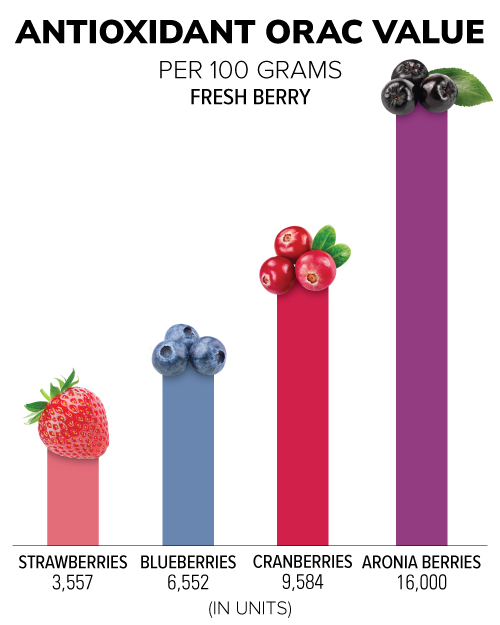

Inflammation may be the Flame, but Oxidative Stress Lights the Match!
Inflammation is a natural protective action that happens at the site of any injury, so it isn’t always bad. Its main function is to heal the damaged, tissues or joints. So in acute cases, like accidentally hitting your finger with a hammer, an inflammatory response actually helps. It could be compared to a firefighter rushing out to stop a house from burning. First, they’ll stop the damage by addressing the immediate problem of putting out the fire. And by doing so, the rest of the house will remain safe.
However, you don’t need a firefighter to spray down your house constantly to prevent a fire, just like you don’t need to address pain if you’re not in pain.
That’s where stopping oxidative stress comes to forefront.
Oxidative stress and damage can also cause much of the inflammation in the body, including unhelpful chronic inflammation that you may feel you are constantly fighting.
The good news is, with the right nutrients, you’re much more likely to keep yourself—your “home”—safe and free of oxidative damage, and stop systemic, chronic inflammation from occurring in the first place.
In other words with no oxidative stress, there is no need for inflammation.
Has potentially serious consequences. It is a primary cause and effect of multiple diseases and adverse health conditions.
Asthma Chronic Bronchitis
Arthritis Rheumatism
Alzheimer's Disease
Parkinson's Disease
Memory Loss
Depression
Stroke
Glomerulonephritis Chronic Renal Failure
Cataracts Retinal Diseases
Arteriosclerosis Hypertension Ischemia
Cardiomyopathy Heart Failure Heart Attacks
Cancer Aging Diabetes Inflammation Infection
Aronia Berry and Grape Seed Extract
Antioxidant Protection from Head to Toe
Head to toe, from preventing dementia to reducing risk of nerve damage in hands and feet, the antioxidant power of aronia and grape seed can keep your body healthy and strong. While there are numerous benefits associated with aronia and grape seed OPCs, here is a summary of what the scientific research has to say about some of the principal effects of these two incredibly important antioxidants.


HEART
Heart disease remains a leading cause of death in America, and one that may often be preventable. The ability to keep arteries flexible and strong, and protect them from oxidative stress, are critical ways aronia and grape seed can lower blood pressure, prevent abnormal blood clotting, and reduce risk of heart attack and stroke.


BRAIN
Brain cells are highly sensitive to oxidative stress, which is why intake of antioxidants is so important for healthy brain aging and preventing mental decline. In an experimental model of Alzheimer’s disease, treatment with aronia berry reversed memory problems and returned memory and behavior to normal, while grape seed extract has been shown to protect the brain against the damaging changes associated with Alzheimer’s disease.


BLOOD SUGAR
While nothing can replace making significant lifestyle changes, aronia berry and grape seed extract can play an important role in helping to improve insulin sensitivity and decrease blood sugar and HbA1c levels. In adults with type 2 diabetes, aronia (administered as a juice) reduced HbA1c levels by 20 percent and fasting blood sugar levels by over 30 percent.


CANCER
Leading-edge studies with aronia berry extract show that it can help overcome cancer cell resistance to chemotherapy drugs and make those drugs more effective. In research conducted by my friend and cancer researcher Dr. Ajay Goel PhD, aronia berry extract provided 6 times the cancer-fighting power against colon cancer compared to untreated cells. His work has also reported that combining aronia berry extract with French grape seed extract reduced cancer-promoting gene activity by 75 percent. Previous published studies have found that aronia inhibits the growth of breast, colon, and cervical cancer cells as well.
The French grape seed extract I recommend has multiple studies showing that it not only shrinks cancer cells into oblivion, but also prevents tumor recurrence, because OPCs from this extract kill cancer stem cells--the seeds of tumors that conventional chemotherapy drugs can’t reach. And, like aronia berry extract, scientific research has shown that French grape seed extract can make chemotherapy drugs more effective as well.


EYES/VISION
The eyes are incredibly delicate structures and are subject to significant strain and oxidative stress due to blue light from excessive screen time, dust and particulates, blood sugar levels, and exposure to sunlight. Fortunately, both aronia and grape seed extract can protect the precious gift of sight. Laboratory research with aronia has found that it may protect against age-related macular degeneration by strengthening the outer layer of the retina by 44 percent and decreasing levels of damaging oxidative compounds.
Grape seed, too, has excellent vision-protecting ability, and may help prevent cataracts, which affect over 24 million Americans over the age of 40. Laboratory study found that grape seed extract activates natural antioxidant proteins that swoop in to stop oxidative damage to the cells of the lens.
In a one-year, multi-center, double-blind clinical trial, grape seed extract outperformed calcium dobesilate, a drug often used for retinopathy, in reducing hard exudates, waxy deposits in the retina created from lipid material leaking from blood vessels in the eyes.
